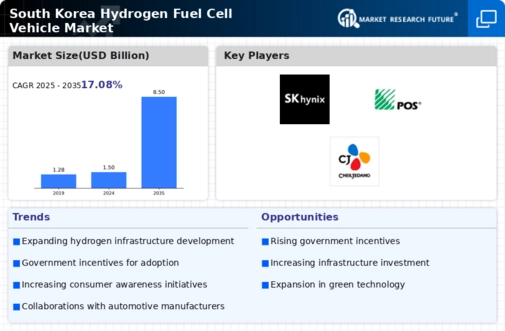The South Korea Hydrogen Fuel Cell Vehicle Market is undergoing significant evolution, shaped by technological advancements, policy support, and increasing consumer awareness regarding sustainable transportation solutions. As one of the world's most technologically advanced automotive markets, South Korea is making substantial investments in hydrogen fuel cell technology as part of its broader strategy to promote clean energy sources and reduce greenhouse gas emissions.
The competitive landscape is characterized by a mix of domestic and international players, each vying for market share while making strides in research and development to improve fuel cell technology's efficiency and practicality.
The landscape is also influenced by government incentives, infrastructure development for hydrogen refueling stations, and the ongoing need for manufacturers to differentiate their products in a rapidly evolving sector. Such dynamics create both opportunities and challenges for companies looking to establish a strong foothold in this niche market.
Kia Corporation has positioned itself as a pivotal player in the South Korea Hydrogen Fuel Cell Vehicle Market, leveraging its robust research and development capabilities to contribute to advancements in hydrogen fuel technologies.
The company is recognized for its commitment to sustainability and innovation, focusing on producing vehicles that meet the growing demand for cleaner transportation options. Kia's strengths lie in its ability to combine cutting-edge design with efficient performance, appealing to eco-conscious consumers. Moreover, Kia has enjoyed a supportive domestic market, backed by government policies promoting hydrogen fuel use. The company has been actively developing and launching hydrogen fuel cell vehicles, marking its intent to lead in this market segment.
Its strategic partnerships and collaborations bolster its position further, enhancing its ability to innovate and compete effectively.Toyota Motor has a notable presence in the South Korea Hydrogen Fuel Cell Vehicle Market, recognized for its pioneering efforts in hydrogen technology.
The company has been a frontrunner in developing hydrogen fuel cell products, with its models being well-received in the South Korean market. Toyota's strength lies in its extensive experience and technological advancements, enabling it to produce high-performance fuel cell vehicles that align with consumer expectations for reliability and sustainability. The company has made strategic investments in infrastructure to support hydrogen fuelling stations in South Korea, ensuring a seamless experience for customers.
Additionally, Toyota's commitment to partnerships and collaborations within the industry further enhances its position, allowing it to share resources and expedite the development of hydrogen technologies. This combination of innovative products, a strong local market presence, and strategic growth initiatives solidifies Toyota's role as a key competitor in the South Korea Hydrogen Fuel Cell Vehicle Market.














Leave a Comment